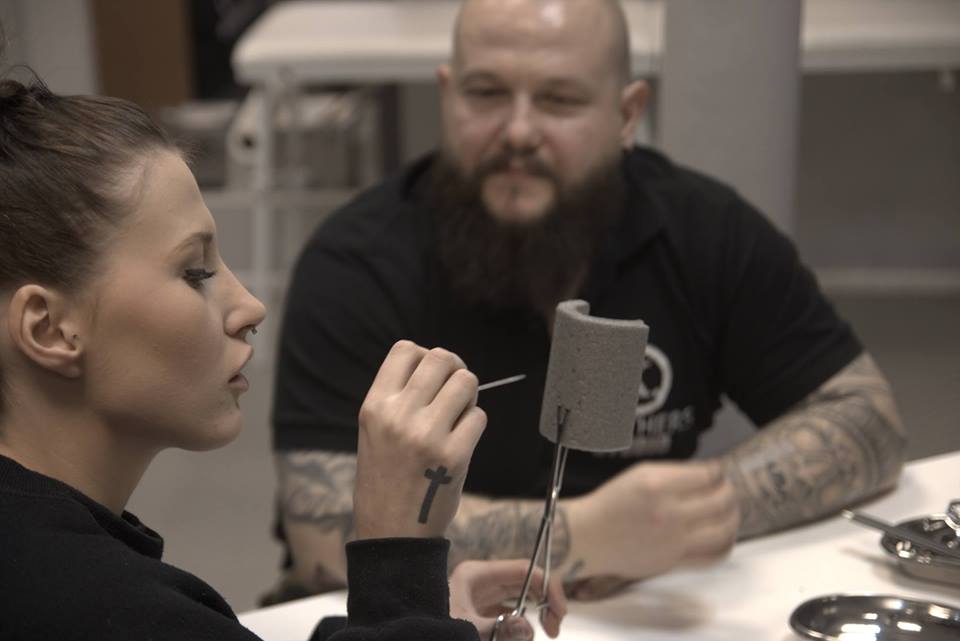It's a New Day in Public Health.
The Florida Department of Health works to protect, promote, and improve the health of all people in Florida through integrated state, county, and community efforts.
Body Piercing Program
Contact the Body Piercing Program
Body piercing, a form of body art, is the act of penetrating the skin to make, generally permanent in nature, a hole, mark, or scar. It does not include the use of a mechanized, pre-sterilized ear-piercing system that penetrates the outer perimeter or lobe of the ear or both.
Florida Regulations
Make an Informed Decision
10 Common Questions about Body Piercing - Brochure
Training for Piercers and Operators

In Florida, operators and piercers (as defined in section 381.0075, F.S., and Chapter 64E-19.002, F.A.C.) are required to complete an initial formal training course prior to licensure of a body piercing salon or practicing body piercing in Florida.
Every year after the initial training, operators and piercers may complete an initial formal training course or a refresher course.
- An initial formal training course must be completed prior to completing a refresher course, in accordance with section 64E-19.007, F.A.C.
- View Upcoming Initial and Refresher Body Piercing Trainings and Training Providers
Initial Formal Training Course - Teaches infection control procedures, including safety, sanitation, sterilization requirements, and standard precautions for preventing the transmission of infectious diseases, as well as the requirements of Florida laws.
Refresher Training Course - May teach one or more of these subjects.
These courses do not teach body piercing techniques, nor does the Florida Department of Health maintain a list of such courses or schools.
Becoming a Body Piercing Training Provider
Upon request, a body piercing training course curriculum is reviewed by the Florida Department of Health to ensure compliance with the requirements of Florida laws.
Proper infection control procedures are taught to minimize the risk of injury and infection that can result from body piercing procedures. Training providers must have the required knowledge, experience, and credentials.
Training providers interested in requesting review of their curriculum should contact the Body Piercing Program for additional information.
Piercing of a Minor
A person may not perform body piercing on a minor without the written notarized consentfrom the minor's parent or legal guardian.
An establishment may not perform body piercing ona minor under the age of 16, unless the minor is accompanied by a parent or legal guardian, as specified in section 381.0075, F.S.
- Non-compliance constitutes a misdemeanor of the second degree (section 775.082 or section 775.083, F.S.)
Complaints concerning the piercing of a minor should be reported to the local law enforcement agency and the local county health department in the county where the incident occurred.
Body Piercing Salons, Applications, and Forms
Body-piercing salons and temporary establishments require an operating license that is renewed annually section 381.0075, F.S., and Chapter 64E-19, F.A.C.
To apply for a salon license, complete the Application for Body Piercing Salon License and submit it along with the license fee to the local county health department where the salon is located.
- Before applying for any body-piercing salon license, please contact your local county health department for the mailing address and any local fee.
Injuries, Complaints, and Suspected Infection
Operators of body-piercing salons and temporary establishments must report any injury or complaint of injury, suspected infections that required treatment by a licensed practitioner, or any notifiable diseases resulting from the body piercing procedures.
- Body Piercing Salon Injury Report Form should be sent to the licensing county health department within 72 hours of the operator becoming aware of the complaint or condition.
The following forms are provided as a convenience to assist body piercing salons in following the record keeping guidance (requirement of in Chapter 64E-19, F.A.C.):
Jewelry
Body piercing salons must use only jewelry that is made of implant grade, high-quality stainless steel, solid gold of at least 14K weight, niobium, titanium, platinum, a dense, low-porosity plastic, or silver and that is free of nicks, scratches, or irregular surfaces for new piercings (section 381.0075(11)(a)5, F.S.).
New body piercings heal faaster with highly polished jewelry, fabricated from high-quality metals, such as implant grade stainless steel and titanium.
- ASTM International (ASTM) has developed standardized specifications for steel mills that manufacture the various grades of metals. Implant grade, high-quality stainless steel must be manufactured to meet ASTM F 138 and implant grade titanium must be manufactured to meet ASTM F136.



Connect with DOH